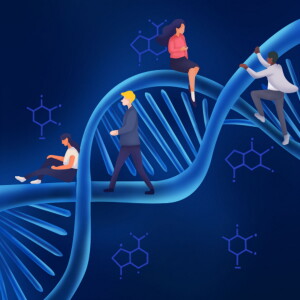
Tuesday Apr 23, 2024
The Genetic Legacy: Exploring the Controversial Claims of 'A Troublesome Inheritance' by Nicholas Wade
How might the ideas presented in A Troublesome Inheritance impact future research in the fields of genetics, anthropology, and sociology?
The ideas presented in A Troublesome Inheritance, particularly those related to the role of genetics in shaping human behavior and social hierarchies, may have a significant impact on future research in the fields of genetics, anthropology, and sociology.
In genetics, researchers may be prompted to further investigate the role of genetic variation in shaping individual behavior and traits, as well as in influencing complex societal structures. This could lead to new insights into the genetic basis of differences between populations, and could potentially inform future studies on the evolution of human society.
In anthropology, the ideas presented in the book may lead to a reassessment of traditional views on the origins and development of different human societies. Researchers may be encouraged to incorporate genetic data into their studies of human cultural diversity, and to explore how genetic variation has influenced the formation of different cultural practices and traditions.
In sociology, the book's discussion of biological differences between human populations and their potential impact on societal structures may stimulate new research into the ways in which genetic and environmental factors interact to shape social behavior and institutions. This could lead to a deeper understanding of the complex relationship between biology and society, and could provide new insights into the factors that contribute to social inequality and disparities.
Overall, the ideas presented in A Troublesome Inheritance have the potential to spark important discussions and debates within the fields of genetics, anthropology, and sociology, and may shape the direction of future research in these areas.
What are some key takeaways or lessons that readers can draw from Wade's book?
- The importance of critical thinking: Wade emphasizes the importance of questioning authority and thinking critically about the information presented to us, especially in today's era of fake news and misinformation.
- The impact of technology on society: Wade discusses the ways in which technology has shaped our society, from the rise of social media to the implications of AI and automation on the job market.
- The role of identity in shaping our beliefs: Wade explores how our identities, whether based on race, gender, or nationality, can influence our beliefs and attitudes towards others.
- The dangers of tribalism: Wade warns against the dangers of tribalism and groupthink, urging readers to be wary of the dangers of us vs. them mentality.
- The need for empathy and understanding: Wade advocates for empathy and understanding towards those with differing beliefs and backgrounds, in order to bridge divides and promote constructive dialogue.
How does Wade define race in his book, and what are the implications of this definition?
In his book "Race and Ethnicity in Latin America," Peter Wade defines race as a social construct that is used to categorize and differentiate people based on physical characteristics such as skin color, hair texture, and facial features. He argues that race is not based on any biological or genetic differences, but rather is a product of historical, cultural, and political forces.
The implications of Wade's definition of race are significant, as it challenges the idea of race as a fixed and natural category. By highlighting the social and arbitrary nature of race, Wade demonstrates how racial categories have been used to justify discrimination, inequality, and oppression. This definition also opens up space for discussions about the fluidity and complexity of racial identities, and challenges essentialist notions of race. Ultimately, Wade's definition of race calls attention to the constructed and dynamic nature of racial categories, and the need to critically interrogate the ways in which race shapes identities and experiences.
No comments yet. Be the first to say something!